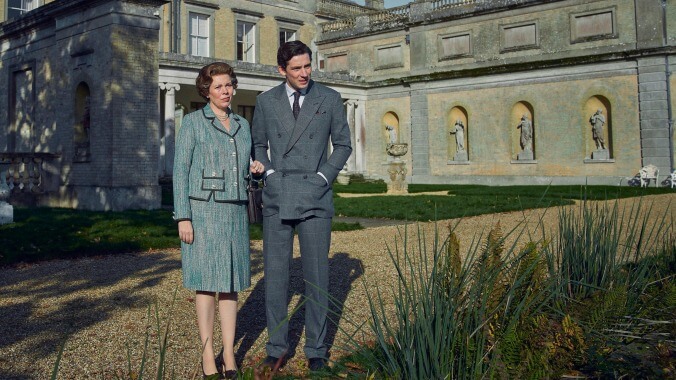The Crown finally (finally!) explores Elizabeth as a mother


After the first season of The Crown casually elided a major character’s Nazi connections, season two had to spend an entire episode retconning that topic into existence. “Favourites” essentially does the same thing with Elizabeth’s role as a mother. At the end of the hour, Elizabeth delivers a revelatory monologue explaining why she wanted to have more children after becoming Queen, which, you know, might have been an interesting topic to actually explore in season two, back when the show was whizzing past those pregnancies as an afterthought. But it’s a “better later than never” addition to a series that’s always been curiously reluctant to explore its protagonist’s inner life, especially as it relates to motherhood.
When Margaret Thatcher’s son Mark (Freddie Fox) goes missing during a cross-country car race in the Sahara Desert, Elizabeth is shocked to hear the distraught Prime Minister offhandedly refer to him as her “favorite child.” After Philip teases his wife for her lack of self-awareness about who her own favorite is (his, of course, is Anne), Elizabeth sets up private lunches to check in on her four adult children, and, more importantly, assess how she feels about them. And that allows The Crown to finally take stock of relationships—and in some cases, entire characters—it’s never really invested in before.
Elizabeth’s luncheon with the newly introduced teenage Prince Edward (Angus Imrie) gets things off to a rocky start as he displays all of the entitled, power-hungry cruelty that can come from being raised as a royal. Yet, as ever, The Crown emphasizes that monarchy is both a privilege and a curse. A big reason Edward’s personality has curdled into something rotten is because his princely status makes him a target for cruel bullying at school. Elizabeth responds to that revelation in a way that establishes a pattern she’ll follow for most of the episode: She seems incredibly concerned and then does very little to try to improve the situation.
“Is doing nothing your solution to everything?” Anne asks after opening up to her mother about the way her life and marriage feel like they’re spiraling out of control. The scene is Erin Doherty’s best work on The Crown to date, and, as ever, makes me wish there were more Anne on this series. What’s especially heartbreaking is that we know there’s so much of her daughter’s story that Elizabeth can personally relate to—from marital troubles to feeling outshone by a younger, flashier royal. But Elizabeth just doesn’t have the emotional acumen to make a sympathetic connection. So she winds up driving Anne away instead.
“Favourites” draws a sharp contrast between Elizabeth as a woman of passivity and Thatcher as a woman of action. Unfortunately, the show is thunderously unsubtle in making that point, or in making any of its points about Thatcher’s relationship with her own children. Thatcher and her daughter Carol (Rebecca Humphries) openly discuss their troubled dynamic in a way that feels far too on-the-nose for how lifelong family resentments actually operate. And while I’m no Thatcher defender, the suggestion that the Falklands War started as a misplaced outlet for her anxiety over her missing son feels borderline offensive given that in real life Mark’s misadventure took place in January of 1982 and the scrap metal dispute didn’t happen until March of that year.
The Elizabeth stuff is comparatively much subtler. It doesn’t become clear until the end of the episode that Elizabeth isn’t actually visiting her children in a random order. Her final monologue clarifies that she basically considers her kids to be two sets of two: The constitutionally required “heir and a spare” she had as a princess in her early 20s, and the two children she chose to have as a settled Queen in her 30s. (There’s a full 10 year gap between Anne and Andrew.) Elizabeth meets with the younger, more rebellious half of each sibling set before finally comparing Charles and Andrew (Tom Byrne)—the two boys who, in some ways, each feel like an eldest son.
And it’s a pointed study in contrasts. Charles has inherited the worst qualities of both of his parents. He’s dull and passive like Elizabeth but also petulant and self-centered like his father. Andrew, however, has inherited the best qualities: He’s fun and fiery like Philip but thoughtful and dutiful like his mother. Elizabeth eventually confesses that she saw Andrew as her chance to make up for her failings with Charles, who she struggled to connect with even during something as simple as bathtime. And while it’s clear that Elizabeth was never the best or warmest of mothers to any of her children (she hilariously asks for briefings on their hobbies and interests), Andrew is the one she came closest with. They share an easy mutual love of poached salmon and nerdy jokes about the history of royal titles. It’s no wonder he’s her favorite.
Yet there’s trouble on the horizon too. Andrew’s giddy excitement over his girlfriend’s movie about a 17-year-old being seduced by “twisted and perverted older predators” is The Crown’s somewhat clunky way of acknowledging his present-day circumstances. (As of 2019, Prince Andrew has suspended all public duties over his involvement with sex trafficker Jeffrey Epstein.) And Edward, Anne, and Charles have even more immediate issues looming too.
For as much as Elizabeth struggles to communicate her emotions, she’s remarkably astute at reading them in other people. She can sense danger where Philip can only see business as usual, even if her passivity prevents her from doing much about it. Of her four children, Charles is the only one Elizabeth directly advises, which speaks to his unique position as both her successor and her least favorite. I have to say, it’s immensely satisfying to see Charles finally get a good dressing down this season. Elizabeth warns him that his victim complex is hardly the best look for a man who spends his days flirting with his mistress and building a palace to honor his own greatness, all while he’s got an unhappy, heavily pregnant wife upstairs.
“Favourites” is a fascinating domestic drama that puts Elizabeth’s royal duties in a new light too. Philip suggests that until their adult children sort themselves out, it’s Elizabeth’s job to “stick around, stay alive, and keep breathing” for the sake of the country. That reframes Elizabeth’s lengthy reign as an active choice, even if the active choice is, essentially, inaction. If she can’t be the ideal mother to her children, she can at least try to be the ideal “mother to the nation.” And with the nation’s sons shipping off to the Falklands, that’s a role her people may need now more than ever.
Stray observations
- I would’ve loved to have actually seen Elizabeth’s conversation with Margaret and Queen Mother. Alas, three women talking about the complexities of motherhood is probably too much to expect from The Crown.
- There’s so much to unpack in Thatcher’s commitment to being the perfect housewife even as she resents her own mother for being “just” a housewife.
- Andrew’s Richard III joke was legitimately very funny.
- This season’s focus on Diana’s youth has made me reflect on the fact that Elizabeth was just 21 when she got married and 22 when she had Charles.
- It’s lovely to see shots of Jared Harris and Matt Smith in the photo album Elizabeth flips through.
- Thatcher’s son Mark is one of the most hilariously hateable characters in The Crown’s history. Kudos to Freddie Fox for perfectly capturing his sense of childish entitlement.
- It will never not be funny to hear Charles boast about how wild and unconventional he is. Talk about someone with a breathtaking lack of self-knowledge!